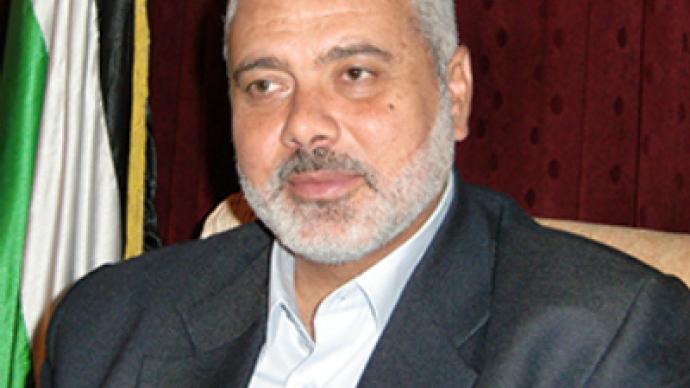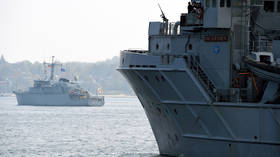We won’t give up our right to a Palestinian state - Haniyeh

In an interview to Russian correspondent Nadezhda Kevorkova, head of the government in Gaza Ismail Haniyeh shares his vision of different countries' contributions to Middle East settlement and its perspectives.
He also discusses if there is a difference between Russia's and America's contribution into the settlement.
Q: How do you regard the blockade of Gaza? What kind of measure is that?
Ismail Haniyeh: It is collective punishment of a people for its political choice. It is violation of all human rights and international laws; it is discrimination of the Palestinians and an attempt to remove the Palestinian government and to destroy the Palestinians. I believe that the blockade will be lifted.
After what happened to the Gaza Freedom flotilla, the blockade is a factor of pressure more on Israel than on Gaza. Israel is now facing pressure from the entire global community, which demands that the blockade be lifted.
Q: Israel says that the blockade was a response to Qassam rocket attacks.
IH: Those rockets cannot do any significant damage. Those are small makeshift unguided rockets that are no match for Israeli rockets or Israeli artillery. Israeli propaganda puts things such that those rockets seem way more than what they really are.
As you know, after Israeli army's attack upon Gaza in 2008-2009, we secured agreement to cease Qassam launches from all resistance groups, mainly from Hamas military groups and Islamic Jihad. However, even after that Israel mounted a military operation against the Palestinians. Even these days, they undertake occasional operations and fire at Palestinian people from sea and from air. A few days ago, they fired at people on the shore, killing six Palestinians.
Q: What do you think of Fatah?
IH: It's an important political element of our society and of Palestine's political structure. The problems faced by the Palestinian people cannot be solved separately by either Fatah or Hamas. We must find ways to national reconciliation and establish agreements. We think that an external pressure is being exerted now upon Fatah, and that stands in the way of reaching agreements. Fatah will have to overcome that pressure.
Q: What relations does Palestine have with Iran? Is Iran putting any pressure on Palestine?
IH: Iran is an Islamic country. It supports the Palestinian people and defends Palestinians' rights. Our relations with Iran are the same as with other Islamic countries and our Arab neighbors. Iran is not involved in Palestine's internal relations. It provides support to us, but does set any conditions. None of the countries that support us today dictate any conditions to us.
Q: How do you see Barack Obama's new strategy and the prospects of the plan for a new Middle East?
IH: After Obama's election, we had certain expectations regarding his new policy, especially after his speech in Cairo last year. None of the points he made in it was implemented though. We expected a real change in the situation; we expected that the USA would influence Israel's policy and the blockade would be lifted. Now, a year-and-ð-half after Obama`s election, we see that all his declarations remain just words. They are not implemented and they influence nothing. Today, people have little hope on his inspired speeches and expect no help from him. At the same time, however, he still has the time and opportunity to change the situation.
Q: Russia’s President, Dmitry Medvedev met with political bureau member Khaled Mashal. Are these talks just words too?
IH: Russia is a great country that has long-lasting stable relations with the Middle East countries. Russia supports the rights of the Palestinian nation. We have good relationship with the Russian leaders. Hamas political leaders have visited Russia and its government a number of times.
The meeting between President Medvedev and Mr. Mashal was a great support for the Palestinians. Russian President’s words to Khaled Mashal were very important. He said that Hamas was a part of the Palestinian peace process, and an important part of the political system; and that political negotiations on the Palestine’s future shouldn’t be held without the participation of Fatah and Hamas. He emphasized the importance of national reconciliation and unity, and noted that external pressure wasn’t good for this reconciliation.
The fact that Russia doesn’t consider Hamas a terrorist organization is very important, as well as its appreciation of the confidence Hamas enjoys among Palestinians. Russia recognizes the outcome of the Palestinian election and respects the choice of the Palestinian nation.
We believe this meeting was a very courageous step on the part of President Medvedev. It proved Russia’ standing on this issue.
Russia's position highlights that of the USA, which is not fair. We hope to expand our relations with Russia. We hope that Russia continues supporting the right of Palestinians to their own state with their capital in Jerusalem, insisting on lifting the blockade in Gaza, and enabling the national reconciliation. And we definitely support all Russia’s undertakings in reaching these goals.
I want to invite President Medvedev and Prime Minister Putin to visit Gaza as a practical demonstration of their efforts to lift the blockade. Palestinians would really welcome and respect this step.
Q: Could you explain what happened a year ago with a small group that the media referred to as Al-Qaeda in Gaza?
IH: These people weren’t Al-Qaeda, but rather a small group that wanted to follow Al-Qaeda’s ideas, but wasn’t connected to them. We were aware of them and we tried to negotiate. We began by discussing the issues of resistance from the viewpoint of Islam and general strategy. They refused to negotiate, and their leader blew himself up. 22 people were killed, including six policemen. I can say that this group no longer exists.
Q: The issue of the peace agreement with Israel and its recognition remains a question for Hamas. What could you say about it?
IH: We won’t give up our right to establish the Palestinian state with the capital in Jerusalem, and the right of refugees to return. This process will require a long time, more than ten years perhaps.
Q: The election has been suspended several times, and this issue hasn’t been settled yet. Will the election take place in the Palestinian Autonomy?
IH: We certainly support the election and we want it to take place. This is a civilized and modern way of expressing the democratic aspirations of the Palestinian people. But first, we should reach national reconciliation and then hold the election. It’s not possible to hold the election amid this disruption.
By Nadezhda Kevorkova












